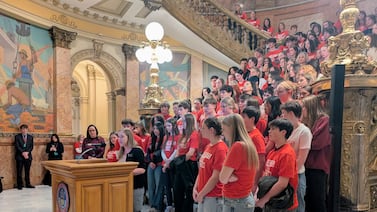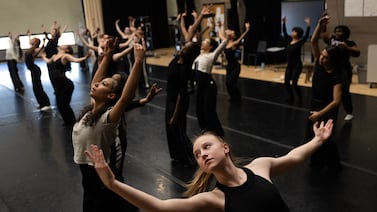Citing a need for teenagers to get more sleep, the Denver school board voted Thursday to push back middle and high school start times until 8:20 a.m. or later, starting in 2022.
The vote was unanimous, but several board members expressed concerns that most of the support for the change came from affluent families. Out of nearly 5,000 survey responses, fewer than 40 came from families at four Denver high schools in working-class neighborhoods.
“The voices of my community members haven’t been heard,” said board member Angela Cobián, who represents southwest Denver. Cobián said she asked a neighbor with children in the district what she thought of the proposal, and her neighbor said she hadn’t heard of it.
Board Vice President Jennifer Bacon and board member Tay Anderson echoed Cobián. Anderson said he was planning to vote “no” but changed his mind after the sponsor of the proposal, board member Scott Baldermann, added a clause that requires the superintendent to engage with the community and mitigate concerns before the late start goes into effect.
The later start times will result in a shift for some schools, but not all. Start times vary, with some middle and high schools starting as early as 7:30 a.m. Others already start later.
The school board resolution notes that “multiple studies have demonstrated that healthy school start times result in increased attendance, reduced tardiness, and higher graduation rates.” Other Colorado districts, including Cherry Creek and Greeley-Evans, already have late starts.
A first draft of the resolution proposed delaying secondary school start times until 8:30 a.m. That was changed to 8:20 a.m. after district staff said an 8:30 start would interfere with a new bell schedule set to go into effect this fall, said Jim Carpenter, deputy superintendent of operations.
The district collected 4,767 responses to a survey this spring that asked parents four open-ended questions about the pros and cons of later start times. A presentation to the school board notes that affluent communities were overrepresented in the results.
One-third of all responses came from families with children at East High School, McAuliffe International middle school, Denver School of the Arts middle and high school, and Northfield High School, all of which serve significant numbers of middle- and upper-class families.
Secondary schools on the Montbello, West, John F. Kennedy, and Abraham Lincoln campuses were not well represented, with 10 or fewer responses each. Those campuses serve many Black and Hispanic students, a high proportion of whom come from low-income families.
“This is not what we would call a representative sample,” Elizabeth Stock, the district’s director of research and evaluation, told the school board Thursday.
The presentation noted that open-ended questions take a long time to analyze. Instead, the district made word clouds highlighting the most common words families used in their responses. For three of the four questions, the most common word used was a generic one: “school.”
Stock said families cited benefits of later start times that included teenagers getting more sleep and being more alert at school. However, she said some families expressed concerns about students having less time for activities after school. And some said the later start times would make it difficult for parents who start work early to ensure their children get to school on time.







